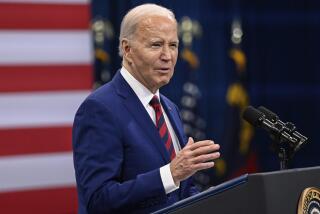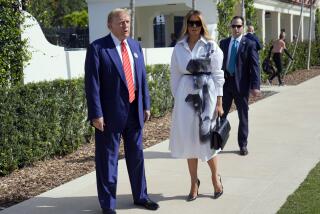2012 election still all about battleground states
With all the Republican angst over the party’s unsettled primary contest and Democratic cheering over improved economic news, it’s good to keep in mind how little has changed in the overall shape of the 2012 election: Fewer than a dozen states continue to appear to be clear battlegrounds.
President Obama still holds leads along the West Coast, in much of the Northeast and Mid-Atlantic regions and in parts of the upper Midwest, giving him a likely base of 217 electoral votes out of the 270 needed to win, according to the latest Real Clear Politics compilation of state-by-state polls. A Republican can count on virtually all of the South, the Plains states and conservative parts of the West, giving the eventual GOP candidate a likely base of 181.
The states in between – the ones where the election almost certainly will be decided – include Colorado and Nevada in the West, where Obama will need a strong Latino turnout to win; Iowa, Wisconsin, Ohio and Pennsylvania, where a key issue will be his ability to appeal to blue-collar voters; North Carolina and Virginia, where Democrats hope a combination of a strong black turnout and support among college-educated whites will do the trick; and Florida, a perennial tossup.
In two states where Obama was doing poorly last year, Missouri and New Hampshire, some recent polls have shown the race a tossup, potentially adding those to the list.
Those tossup states collectively have 140 electoral votes. Assuming the list of solid states remains as is, a Republican candidate will have to pick up 89 of the tossup electoral votes to win, while Obama would have to pick up 53. Most analysts assume Obama will need to hold Wisconsin and Pennsylvania, which he carried in 2008, and which together have 30 electoral votes. He would then have several possible ways to put together the additional 23 needed for victory.
Recent polling also sheds some light on the past week’s controversy over birth control coverage and religious institutions.
A nationwide poll last week by the Democratic firm PPP showed that by a 36%-58% margin, self-identified Republicans opposed the administration’s rule requiring most employers, including those with religious affiliations, to offer birth-control coverage to their workers. That margin makes clear why Republican presidential hopefuls have been competing to take the strongest positions against the requirement, which is part of the Obama administration’s health reform law.
But in a general election context, the picture could be very different. Among all voters, the rule won support 56%-37%. Although the nation’s Roman Catholic bishops have been leading the opposition to the rule, which affects Catholic hospitals, universities and charities, the results among Catholic voters were almost identical to those of the voting population at large, 53%-44%. The poll was conducted before Obama revised the rule in a move that won support from the Catholic Health Assn. and Catholic Charities, although not from the bishops.
Although PPP does polls for Democratic candidates, its surveys of the Republican primaries over the past year have been highly accurate.
david.lauter@latimes.com
More to Read
Get the L.A. Times Politics newsletter
Deeply reported insights into legislation, politics and policy from Sacramento, Washington and beyond. In your inbox three times per week.
You may occasionally receive promotional content from the Los Angeles Times.







